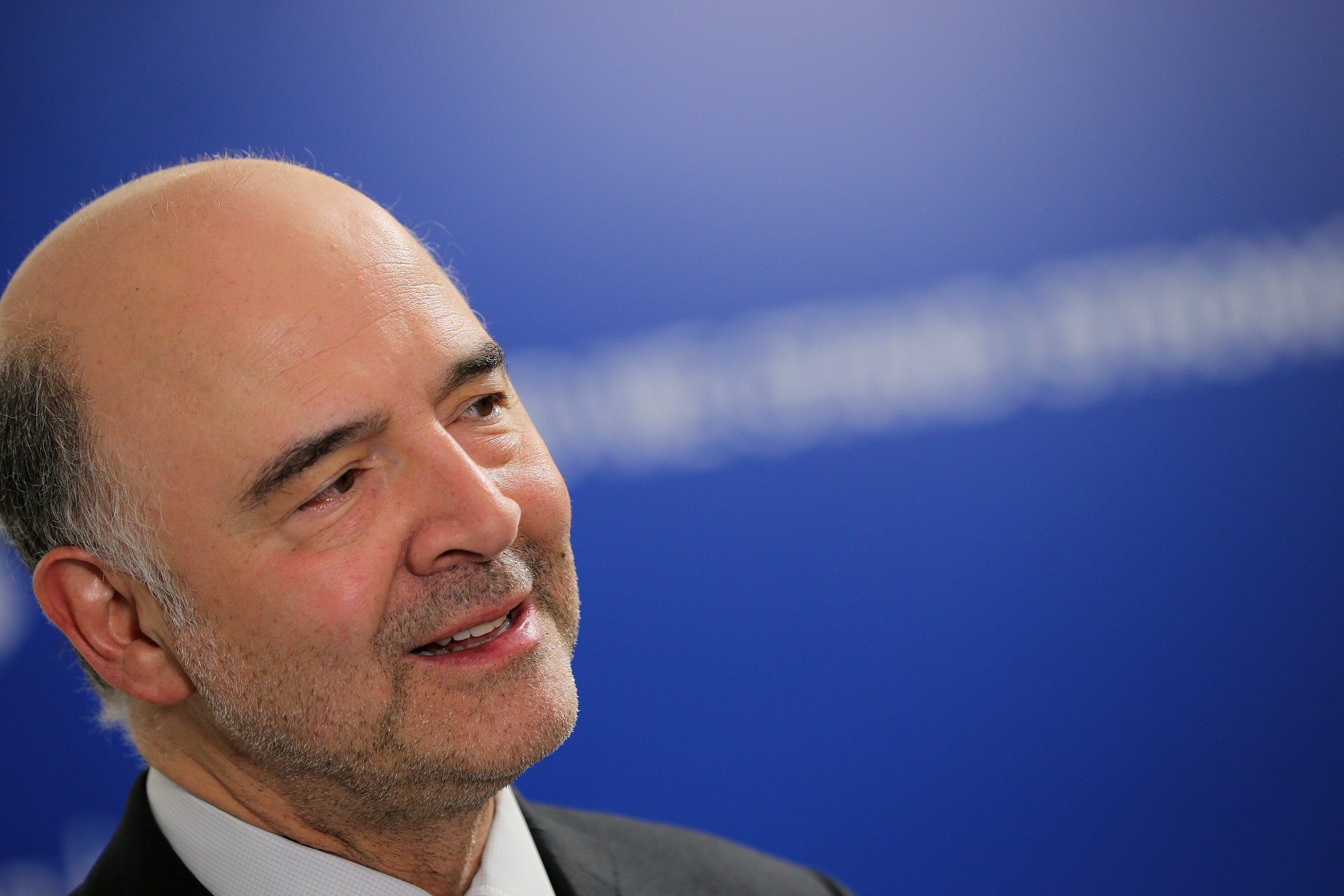Economic and Financial Affairs Commissioner Pierre Moscovici, in an exclusive interview with To Vima, outlines the four difficult preconditions for Greece to exit the bailout programme, as well as the supervisory framework that will be set up thereafter.
He stresses that all the reforms agreed to with creditors must be implemented. Then, Greece and the creditors must make decisions about debt relief measures, a growth strategy, and the post-bailout framework that can assure creditors that reforms will continue and fiscal targets will be met.
Moscovici avoids using the word surveillance. He says that the “post-programme framework” should not look like or create the impression of a fourth memorandum, but it should guarantee that “Greeks will not live through the same tragedy again”.
The European Commissioner also sends a message indirectly to the Greek political system.
“The international situation mandates that Greece must remain vigilant, and at the same time maintain trust in what it has achieved. Europe helped Greece stand on its own feet, yet the situation in the country remains difficult for citizens and for small and medium-sized businesses. It must continue its efforts towards complete recovery. Hence, it is important for us to find the best way to restore a framework that will allow us to monitor the economic and fiscal policies that will be implemented in Greece after the programme,” he said.
Moscovici favours the participation of the IMF in the programme, even at the last minute, as he believes that will send a positive message to the markets, but he underlines that the eurozone members will take the final decisions on debt relief.
Greece has come a very long way since the turbulent summer of 2015. We are now in the last mile of the programme. We are approaching a key moment for Greece and the euro area. In the next few weeks, our capacity to turn the page of the crisis and austerity will be tested. I am dedicating all my time and energy to forging a balanced compromise around four main conditions!
First, we need to conclude the lastreview between the Greek authorities and the Institutions. This will be the starting point for all of the subsequent elements to fall into place. I cannot stress that enough! Our teams have been working hard with the Greek authorities in Athens this week to reach a staff level agreement, which will need to be followed by a final, determinedeffort to swiftly complete all the outstanding prior actions in the coming weeks.
Second, we need a convincing agreement on debt relief measures from the euro area Member States and the Institutions, one that has a sufficiently meaningful impact for it to be credible to the markets. If Greece shows it has kept its side of the bargain, all other partners must keep theirs!
Third, we need a strong growth strategy to be in place, one that shows the government’s determination to pursue policies that can lift investment and job creation in Greece in the coming years.
And fourth, we need to have a post-programme framework in place that provides both continued support to Greece and appropriate reassurances to creditors that reform implementation and sound fiscal policies will be pursued after the programme ends.
Let’s be clear: the conclusion of the final review, the growth strategy and the pursuitof virtuous economic policiesare key factors for the debt discussion. As a response, Member States must respect the commitments madein 2016 and 2017 and help to reduce the Greek debt.
-The international environment is unstable and the ECB has reservations whether our country will be able to return permanently and stand in the markets. The government declines the solution of the precautionary credit line. What is your position?
First of all, the overall economic picture in Europe today is a positive one: we are seeing the highest growth since before the crisis and our latest forecastindicates that it will remain strong into next year. What is true is that the international environment is increasingly uncertain, geopolitical tensions are high; we see a worrying rise in protectionism; and investors are nervous about the implications of monetary policy normalisation in the US. From the point of view of Greece, this context means we must be vigilant, while keeping confidence in what has been achieved. Greece’s first steps back to the markets have been successful. The next steps can be positive too, provided the conclusion of the programme goes smoothly and commitments are respected. Our task for the coming weeks is to ensure that is the case.
-The «buffer» of liquidity is a solution, but at this stage it “dries” the economy.
Building a liquidity buffer is an important step in preparing for life beyond the programme.
Both Portugal and Ireland had set aside enough funds to cover their financing needs for the first year after the end of their programmes, and that played an important role in restoring market confidence. So it is important that Greece continues to set aside funds to this end as it prepares to return to solely market-based financing. A buffer should not be regarded as a cost, but as an investment in confidence!
– What has become known is that in the new period there will be increased surveillance of Greece by the institutions.
We recognise that after eight years of financial assistance programmes, Greece is yearning for normality. And I have been clear that 20 August must mark a real turning point for the country.There must be a tangible change in the status of the country. The post-programme framework must not look or feel like a fourth programme. The Greek people need to notice that their country has indeed turned a page and opened a new chapter.
At the same time, all the efforts – not to say sacrifices – of the past years should not be swept away at the end of the programme. We need to make sure that the Greek people will not face the same tragedy ever again. Europe has helped Greece to get back on its feet, but the situation remains difficult in several areas, in particular for citizens and SMEs. Greece needs to keep up its effortsin order to recover fully. It is therefore important that we identify the best way to put in place a framework that allows us to keep track of the economic and fiscal policies being pursued in Greece after the end of the programme.
– Do you think that after eight years the IMF’s involvement remains necessary?
I want to see the IMF come on board. The IMF has been an important partner for the EU institutions in Greece since the beginning of the first programme. We have not always agreed on everything, but overall the IMF has brought important expertise, as well as financial resources, to help Greece overcome its crisis. And while not formally a part of the current programme, the IMF has in fact been closely involved in its design and implementation – with IMF staff taking part in the very latest mission in Athens this past week.
So I hope very much that a decision on the IMF’s formal involvement in the programme can be taken in the coming days. Of course, that requires a common understanding to be reached on the question of Greece’s debt. I am in close contact with Christine Lagarde.
-The key to ending the crisis is certainly growth. Still, the government has not published the growth plan for the next period .You have got a first idea of this plan during the Eurogroup of Sofia. How do you comment on it?
The growth strategy outlined to the Eurogroup in Sofia struck me as a serious piece of work. It conveyed the message that the government is committed to sustaining the important changes that have been made to the Greek economy in recent years, which are now starting to bear fruit.
As I have said many times, it is vital that the growth strategy be Greek-designed and owned, and that it be the outcome of an inclusive consultation of all relevant stakeholders. Because the Greek authorities will soon be fully responsible for the future development of the economy.Once finalised, the growth strategy will need to be sufficiently precise to reassure also external actors that Greece will be an attractive place to invest and do business, and in the process create the jobs the Greek people so urgently need.
– The crucial issue of debt alleviation remains open. Are there disagreements between Berlin and the IMF for the final solution that includes the Frenchproposal ? What is Commission’s position on the implementation of the debt measures? What obligations do you think Greece should take in this context?
The Commission is involved in these discussions and I am in contact with all actors on a daily basis to facilitate the discussion. Ultimately the decisions on Greece’s debt must be taken by the euro area Member States, which are Greece’s main creditors. These discussions have been ongoing for several months now and the time has come for them to conclude.
We all know the political constraints faced by the different actors in this debate. The decisions to be taken are not easy. Yet at the end of the day, it is in the interest of the creditor countries too that Greece concludes its programme successfully and in a sustainable manner. That means Greece’s debt burden must be eased meaningfully, with an impact today and in the future too, in a way that is credible for investors considering putting their money into Greece. That is the outcome I want to see and it is what we are working to facilitate.
Greece has made tremendous efforts these past few years, fulfilling commitments made to its international partners, which have required very difficult decisions to be taken. In short, Greece has assumed its responsibilities. Now it is vital that all other partners also assume theirs.




